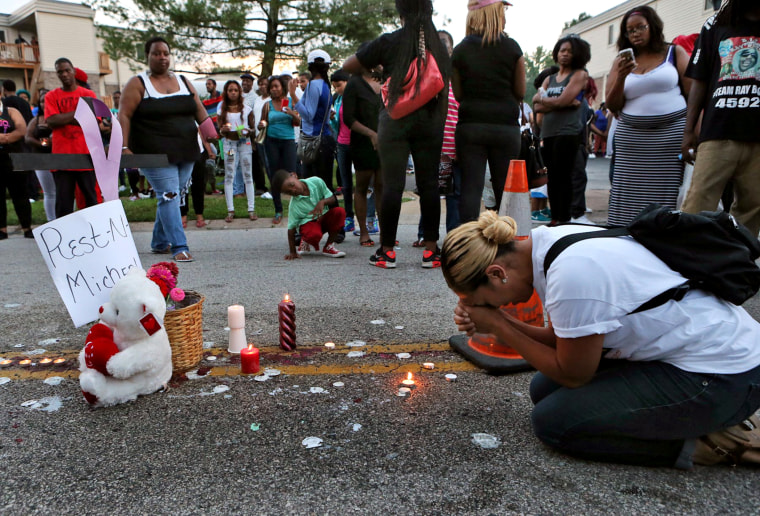Shortly after Michael Brown was gunned down by police in Ferguson, Missouri on Saturday, an image of him wearing a red tank top, a serious face and throwing up two fingers, began circulating in the press. Social media users wondered whether the image had been selected to make Brown look intimidating, as a way of justifying the use of lethal force on an unarmed teen.
A competing image of Brown, looking shy and self-deprecating inside what appears to be some kind of arcade, began circulating as well. Black Twitter users began posting their own contrasting images of themselves under the hashtag #iftheygunnedmedown, exposing the shortcomings of reducing a human being to a single out-of-context picture.
The dual images posted by Twitter users are provocations, challenging observers to wonder if they could spot the Marine or college graduate if they first saw them clad in a hoodie or enjoying a drink. Core to the meme is resisting the concept of "respectability politics," the idea that defying superficial racial expectations can shield minorities from discrimination. The pictures remind us that no one can -- or should have to be --"respectable" all of the time. Several striking contributions were collected by the Root's Yesha Callahan:
The circumstances surrounding Brown's death remain murky. Local police claim he tried to steal an officer's gun. Witnesses have told the press that Brown had his hands in the air when he was shot. Ferguson residents have been protesting over the shooting since Saturday, by Sunday night some protesters had turned to looting and vandalism.
Even after their deaths, black victims of shootings face trial by social media. Shortly after Trayvon Martin was killed in 2012, supporters of George Zimmerman, who was later acquitted of murder charges in connection with shooting Martin, began circulating tweets and photographs that they believed "proved" Martin was not the sweet innocent teenager being portrayed in the media. A popular chain email featured a photograph of rapper The Game as the "true" Martin, tattooed and muscular, a delusional retroactive justification of his death. Accounts describing Renisha McBride, who was shot to death on a Michigan porch for the crime of seeking help after a car accident, seemed to emphasize her blood alcohol level even after her shooter was convicted of murder.
It's as if lethal force is justified not by the objective circumstances, but by whether or not ancient racial fears have made the use of such force seem reasonable. Victims are not only put on trial, but pronounced guilty based not on their actions but on whether or not they fit a stereotype.
The victim being convicted in the court of public opinion may foreshadow an exoneration of their shooter. Sometimes the two bleed together: The defense attorney for the Florida man who killed Jordan Davis, another unarmed black boy, described the trial as being about a "subculture thug issue," rather than about someone opening fire on a car full of unarmed teens.
The question has broader implications beyond the individual shootings. A recent study showed that white Americans are more likely to favor harsh criminal justice policies when they know such policies disproportionately affect black Americans. Self-defense laws like Florida's introduce a level of subjectivity into the issue of self-defense where racialized fears can shape jury outcomes. One analysis of states with stand your ground laws found cases "with a white perpetrator and a black victim are 281% more likely to be ruled justified than cases with a white perpetrator and white victim."
This ritual predates the age of social media. Reality TV star Donald Trump took out a newspaper ad in 1989 suggesting the so-called Central Park Five should be put to death. After they were exonerated years later, Trump called the city's settlement with the men it had falsely convicted of rape a "disgrace" and offered, "these young men do not exactly have the pasts of angels."
Former New York Mayor Rudy Giuliani famously proclaimed that Patrick Dorismond, a Haitian immigrant shot by the NYPD in 2000, was not an "altar boy" (Dorismond had in fact, been an altar boy) after releasing the man's juvenile arrest record.
Marie Dorismond, Patrick's mother, described the phenomenon best in an interview with New York 1. "They kill, and after that, they kill him the other way — with the mouth.”
